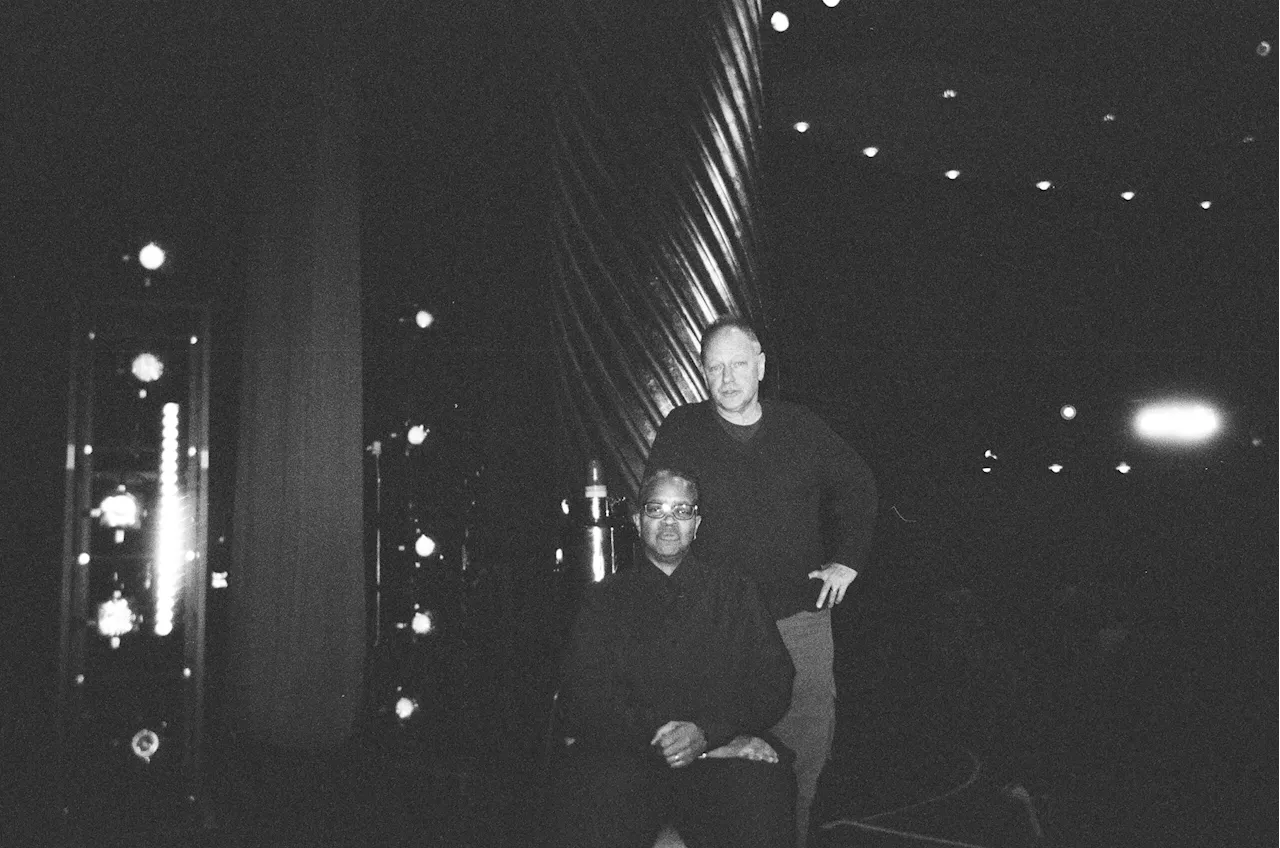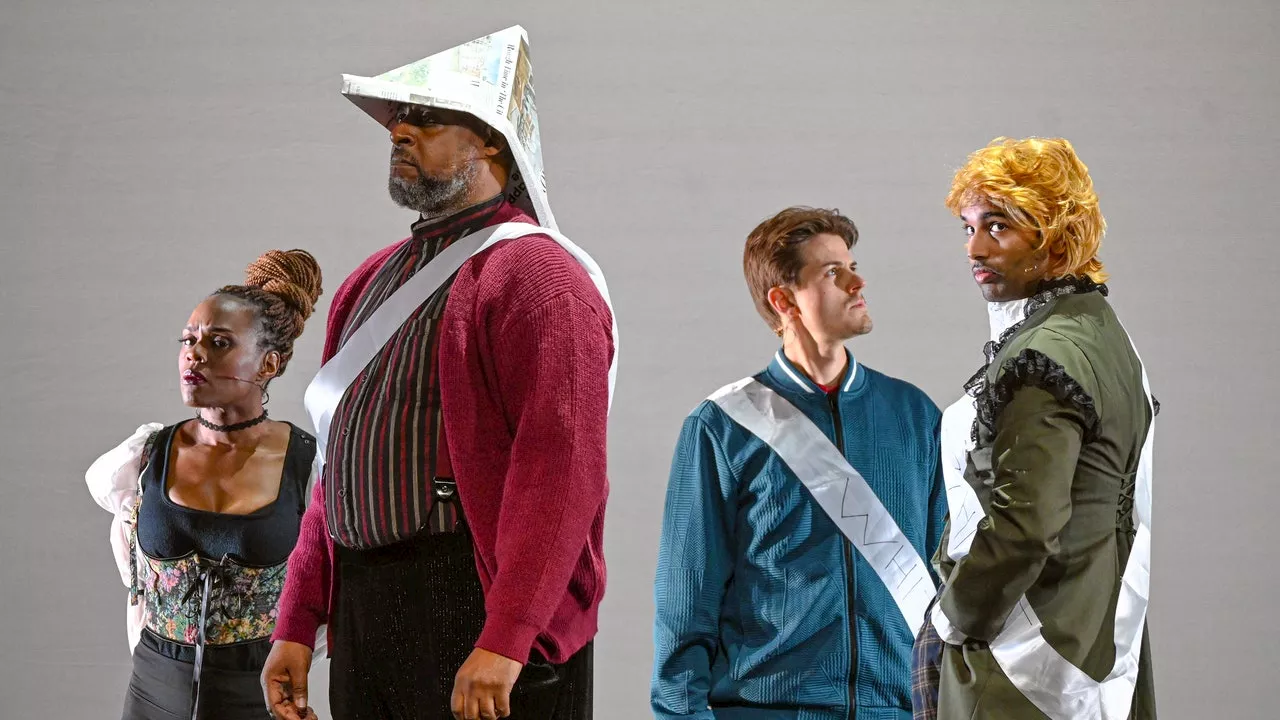David Herskovits and his Target Margin Theatre present a daring and experimental adaptation of the classic musical “Show Boat”, exploring its themes of racial identity and the complexities of American history. The production, playing at N.Y.U. Skirball through January 26th, features a stark and minimalist aesthetic, deliberately blurring the lines between reality and performance.
Now, as part of the Under the Radar festival in New York, David Herskovits and his Target Margin Theatre endorse the pioneering show’s nearly hundred-year-old claim to experimentalism, with “Show/Boat: A River,” a collaboration with N.Y.U. Skirball (playing there through January 26th). Herskovits’s adaptation, apart from two interpolated songs, remains largely faithful to Hammerstein and Kern, though he rejects the original’s upholstered lushness, and keeps his aesthetic as bare as a skull.
This is a “Show/Boat” that expects you to come in knowing the often shocking plot of “Show Boat.” Even if you remember its outline, you may be scrabbling for purchase: Herskovits—a scamp who sometimes casts two actors in a single role, and then has them perform simultaneously—and his set designer, Kaye Voyce, offer very little in terms of illustration. The stage is almost always empty, except for a curtain or a scrim; Herskovits deliberately makes it difficult to know if a scene is “actually” happening or if we’re watching a play-within-the-play. An office water cooler sits off to the right, against the proscenium column at the Skirball, and I assume only real “Boat”-heads will recognize it as the “water barrel,” where the central romantic couple, the ingénue Magnolia (Rebbekah Vega-Romero) and her gambler sweetheart, Ravenal (Philip Themio Stoddard), will eventually bill and coo. Other types of signposting, though, are less subtle. For instance, performers wear satin sashes that say “WHITE” if they play a white character. Stephanie Weeks, a Black actress and director who is a frequent Target Margin collaborator, wears one of these WHITE sashes as Julie, the showboat’s leading lady, as does Edwin Joseph, playing her husband and co-star, Steve. During a run-through for one of the boat’s many melodramas, a Mississippi sheriff storms in, tipped off that Julie is secretly biracial. Steve, perhaps inspired by the characters he plays, cuts Julie’s hand and drinks her blood to fulfill the letter of the state’s “one drop” law. Ferber (and then Hammerstein) was careful to show us that the gesture is dramatic and romantic—and also temporary. Steve will abandon Julie later, the big galoot. Performers, in a mix of period and modern-day rehearsal dress, designed by Dina El-Aziz, occasionally “mark” their lines, as if they’re in a run-through, or they deliver them in the didactic italics of a lecturer. Familiar lines sound deliberately strange. The house lights are still fully up when Weeks, wearing street clothes, speaks the shifting lyrics of the opening number, which Hammerstein himself changed more than once. “Listen,” she says, leaning forward intently. “N-word—work on de Mississippi.” She has already edited the slur as she completes the line. “Black people work while de white folks play.” The way we constantly rehearse identity, particularly racial identity, is the central concern of both “Show Boat” and “Show/Boat,” which may be why we haven’t seen a major theatrical revival in New York since the nineteen-nineties. (The original 1927 version of the show is now in the public domain.) Maybe producers shy from staging the scene at the 1893 World’s Fair, where the showboaters visit the “Dahomey Village” and listen to the exhibited villagers singing in Hammerstein’s faux-African nonsense language. In Target Margin’s finest intervention, the co-music director Dionne McClain-Freeney interpolates the Zulu traditional song “Dumisa” here. (In the original, the “Zulus” confess that they are actually actors from New York, another of Hammerstein’s sly comments on performance.) The musical—both the original and this production of it—can sometimes go slack in its second half, when the plot starts hopscotching forward in time. The excitement of Herskovits’s wrongfooting, Brechtian energy is most relevant in the first half, and it fades a little as the narrative itself lurches. Luckily, Weeks, as Julie, operates at an intensity far different from that of the performances around her, and whenever she appears—too briefly, really—the event surges forward. There are other motive forces, too: the show’s great song, “Ol’ Man River,” sung in throbbing baritone by Alvin Crawford, as the stevedore Joe, forms a current that pulls the show with it. The American theatre does have to grapple with the audacity and the legacy of “Show Boat,” and its long confinement behind copyright has meant that no production before this one has really been able to do so. That may be why “Show/Boat” feels like a first salvo, a still-raw response, which demands further conversation. If you watch the 1951 movie of “Show Boat,” say, you can easily forget the desolation of “Ol’ Man River” ’s lyrics, as Joe smiles benignly, warbling them to the camera across the boat’s frothing wake. But, in Herskovits’s anti-illusionist production, every lyric remains a shock. Listen, Herskovits insists, to the words that closed the first great American musical
SHOW BOAT TARGET MARGIN THEATRE EXPERIMENTAL THEATRE RACE IDENTITY AMERICAN HISTORY NEW YORK THEATRE DAVID HERSKOVITS
United States Latest News, United States Headlines
Similar News:You can also read news stories similar to this one that we have collected from other news sources.
 Inside the New and Ambitious Revival of Oscar Hammerstein’s Show BoatBefore the opening of 'Show/Boat: A River,' a reimagining of Hammerstein's 'Show Boat,' the director joined us to discuss the show's legacy.
Inside the New and Ambitious Revival of Oscar Hammerstein’s Show BoatBefore the opening of 'Show/Boat: A River,' a reimagining of Hammerstein's 'Show Boat,' the director joined us to discuss the show's legacy.
Read more »
USC Trojans Recruiting Target Davon Benjamin's Target Date For CommitmentThe USC Trojans are one of the top choices for class of 2026 safety, Davon Benjamin. The four-star recruit spoke with On3 about what he sees in USC and when he plans to make his commitment decision.
Read more »
 Target Christmas Hours 2024: Is Target Open on Christmas Day?Find out Target's Christmas Eve hours and whether the stores will be open on Christmas Day in 2024.
Target Christmas Hours 2024: Is Target Open on Christmas Day?Find out Target's Christmas Eve hours and whether the stores will be open on Christmas Day in 2024.
Read more »
LeBron James and the Lakers' Struggle with a Thin Margin for ErrorThe Los Angeles Lakers are facing a challenging season, with their star player LeBron James expressing frustration over the team's lack of margin for error. James and coach J.J. Redick acknowledge the need for near-perfect basketball to achieve success, raising questions about the team's roster construction and its impact on their performance.
Read more »
 Rep. Mike Johnson Elected House Speaker by Narrow MarginRepublican Rep. Mike Johnson was elected House speaker during the first round of ballots by a slim margin of 218-215. Johnson secured the speakership after three initially dissenting Republicans switched their votes. He addressed the House, calling for a moment of silence to honor victims of a terror attack in Louisiana and outlining GOP priorities for the new Congress, emphasizing an 'America First' agenda.
Rep. Mike Johnson Elected House Speaker by Narrow MarginRepublican Rep. Mike Johnson was elected House speaker during the first round of ballots by a slim margin of 218-215. Johnson secured the speakership after three initially dissenting Republicans switched their votes. He addressed the House, calling for a moment of silence to honor victims of a terror attack in Louisiana and outlining GOP priorities for the new Congress, emphasizing an 'America First' agenda.
Read more »
 House Speaker Johnson Reelected by Narrow MarginSpeaker Mike Johnson narrowly secured reelection, highlighting divisions within the Republican Party despite their control of the House.
House Speaker Johnson Reelected by Narrow MarginSpeaker Mike Johnson narrowly secured reelection, highlighting divisions within the Republican Party despite their control of the House.
Read more »
